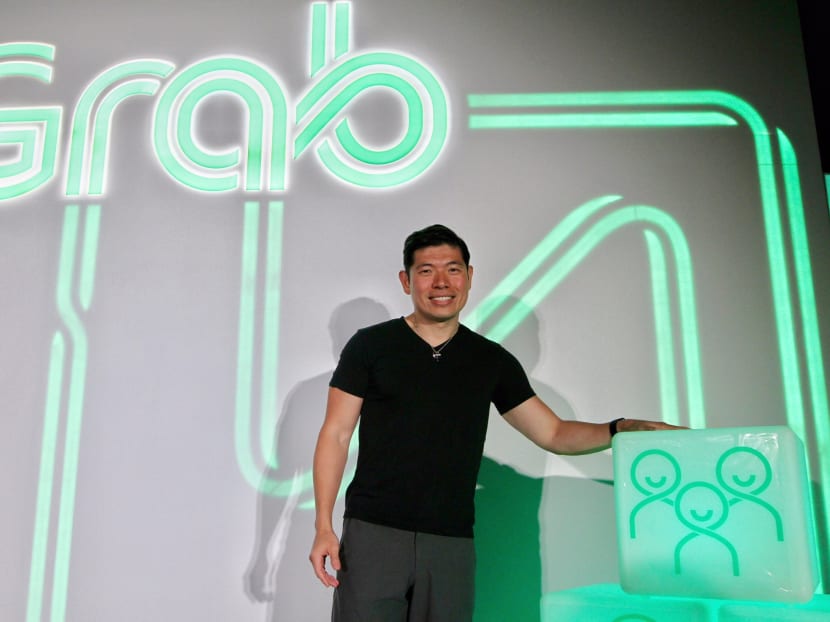Grab 'extremely' confident about addressing anti-competition concerns, co-founder says
SINGAPORE — Proclaiming that the Government “actually wants” Grab in the Singapore market, the ride-hailing firm’s group chief executive Anthony Tan said he is “extremely” confident that the company can work through the issues flagged by the competition watchdog.

Grab co-founder and CEO Anthony Tan unveiled an open platform strategy to build Grab's Everyday Superapp for Southeast Asia on July 10, 2018.
SINGAPORE — Proclaiming that the Government “actually wants” Grab in the Singapore market, the ride-hailing firm’s group chief executive Anthony Tan said he is “extremely” confident that the company can work through the issues flagged by the competition watchdog.
Last week, the Competition and Consumer Commission of Singapore (CCCS) provisionally ruled that the sale of Uber’s South-east Asia operations to Grab in March had led to a “substantial lessening of competition” and price hikes for Grab rides.
Asked about the decision at a media event on Tuesday (July 10), Mr Tan said: “In all relationships, (such as that between) husband and wife, once in a while, you disagree on something. And in the end we all evolve and we all grow together (and) hopefully, we’re still married.”
Mr Tan, who is also Grab’s co-founder, said the Government recognises that the Singapore-based firm plays a “very key role” in the country. For instance, Grab is one of the biggest employers of engineering talent in Singapore, having brought in top minds from technology giants such as social-networking site Facebook and search engine Google.
“In fact, the Government actually wants us,” Mr Tan said, pointing to its work with government agencies such as the Economic Development Board and the Government Technology Agency of Singapore.
“We’ll continue to work very closely (with the Government) to encourage innovation (and) a start-up ecosystem in the region,” Mr Tan said.
The competition watchdog has proposed remedies to restore competition in the market. These include removing exclusivity obligations and lock-in periods for drivers, as well as maintaining Grab’s pre-merger pricing algorithm and commission rates.
It also proposed imposing fines on Grab and Uber for entering into the deal despite having anticipated potential competition concerns. Hitting back, Grab, which will appeal the decision, had criticised the commission for taking a “very narrow approach in defining competition”. It had also said the watchdog’s provisional findings and proposed remedies were “overreaching”, and went against “Singapore’s pro-innovation and pro-business regulations in a free-market economy”.
Mr Tan said Grab would submit its written representation to the commission by July 26. He reiterated that the firm has complied with the law “every bit (along) the way” and will continue to do so.
Stressing the importance of continuing to work with governments, Mr Tan reiterated that the transport sector remained very competitive, with taxi companies and many new forms of mobility operating in the space.
Many of Grab’s competitors have also announced their intention to enter, or have already joined, the Singapore market, Mr Tan noted.
Shortly after the Grab-Uber takeover, homegrown carpooling service Ryde and India’s Jugnoo have dipped their toes into the ride-hailing market. Indonesian ride-hailing giant Go-Jek also announced in May it would enter Singapore and several other regional markets in the “next few months”.
In the aftermath of the Grab-Uber deal, users and drivers cried foul after Grab pared back its promotional codes for rides and drivers’ incentives.
THANKS TO UBER DEAL, GRAB IN THE BLACK ‘IN MANY MARKETS’
Mr Tan said that Grab was already profitable in “many countries and cities”, thanks to factors including its acquisition of Uber’s South-east Asia operations, the growth of its ride-hailing business and its expansion into new areas, such as food delivery.
“We can continue to serve our customers very well and people continue to use us without promo codes… because we are creating a very relevant service,” he explained, adding that the company continues to offer rewards via its loyalty programme GrabRewards and promotions under its GrabFood delivery service.
Introducing more services to customers makes it more efficient for the company, lowers cost and improves its financials, Mr Tan said.
Mr Tan was speaking on the sidelines of a Grab event, where the firm unveiled its on-demand grocery-delivery service GrabFresh under a tie-up with South-east Asian grocery-delivery firm HappyFresh. The service will be rolled out as a beta service in Jakarta, Indonesia this month, and in Thailand and Malaysia by the end of the year.
On whether the service will be available in the Republic, Grab would only say that Singapore was an important market to Grab and HappyFresh — which presently operates in Indonesia, Thailand and Malaysia — and they would “assess Singapore, as well as other South-east Asian markets, as part of normal growth planning”.








